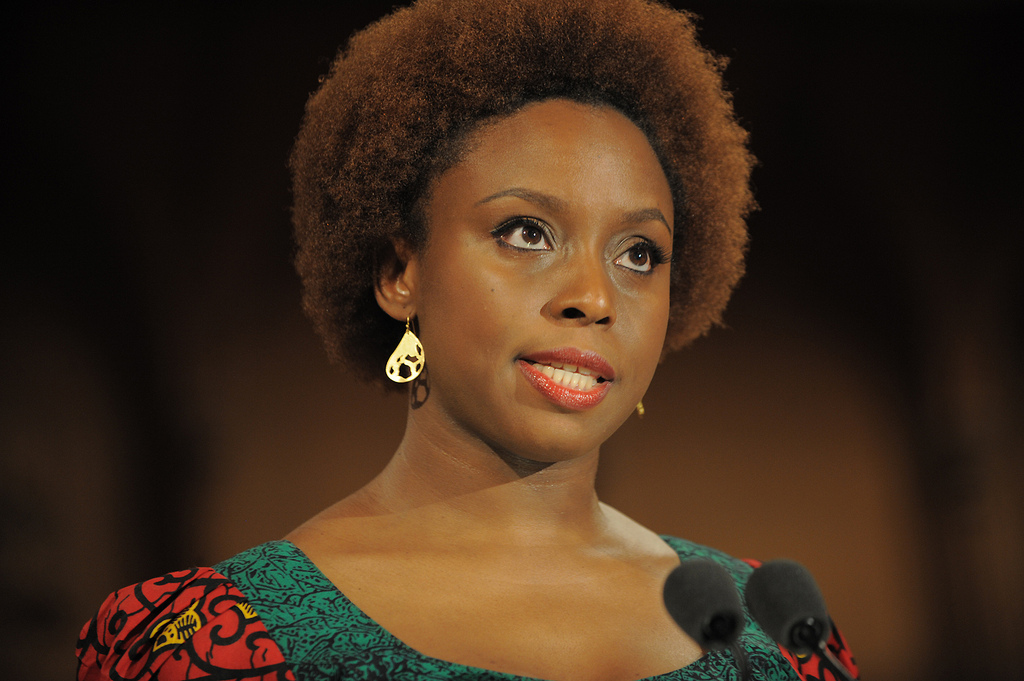As a woman of color, I often find it exhausting dealing with Trump supporters in my mentions defending his divisive words. It’s even more trying when you have to deal with that face-to-face, knowing the block button can’t get you out of said situation. That’s why I tip my hat to acclaimed author Chimamanda Ngozi Adichie for keeping her cool and speaking out after dealing with a man who belittled her right to her face. In a lengthy Facebook post, she explained how the man basically dismissed her arguments by calling her “emotional,” a term not unfamiliar to the many women who’ve experienced mansplaining firsthand.
It all went down as she was participating in a roundtable for BBC’s current events show Newsnight. Actually, she didn’t know it was a roundtable until she arrived at the studio. After learning she’d be pitted against a Trump supporter, she decided to stay. Producers argued that the move would create a balance with both sides represented. Adichie disagreed, saying, “It is a deliberately adversarial strategy that news organizations use in the pursuit of what is often called ‘good television.’ It is about entertainment.” I mean, she has a point.
Still, she agreed to do the show on the condition that she wasn’t required to directly respond to the man identified by NY Mag as R. Emmett Tyrrell, the editor-in-chief of conservative magazine, the American Spectator. Per Adichie, the interview finally got underway and things were calm until Tyrrell threw the word “emotional” into the mix. “I do not respond emotionally like this lady,” he said, according to her post. She then went on to explain why that was so damaging:
He didn’t say my name. Perhaps he didn’t know it because he had not paid attention when we were introduced. Mine is not an easy name for languid American tongues anyway. But that word ‘emotional.’ No. Just no.
Normally I would not think of ‘emotional’ as belittling. Emotion is a luminous, human quality. I am often emotional – gratefully so. But in this context it was coded language with a long history.
To say that I responded ‘emotionally’ to the election was to say that I had not engaged my intellect. ‘Emotional’ is a word that has been used to dismiss many necessary conversations especially about gender or race. ‘Emotional’ is a way of discounting what you have said without engaging with it.
No way was I going to ignore that. Which, predictably, led to an interview in which I found myself, rather than talking about misogyny and populism, responding to a man who claimed that an anti-NAFTA, China-bashing, America-First Donald Trump would be an ‘internationalist’ rather than an ‘isolationist.’
Who presumed that he, a white man, could decide what was racist and what was not. And who insisted that Donald Trump is not a racist, even though the evidence is glaring, even though the House Majority Leader of Donald Trump’s own Republican party condemned Donald Trump’s racism.
She says she left the interview feeling upset, and I’m feeling upset just reading this. The actual video, embedded above, is even more infuriating. You can read the rest of her post here.
(via NY Mag, image via Commonwealth Foundation/Flickr)
Want more stories like this? Become a subscriber and support the site!
—The Mary Sue has a strict comment policy that forbids, but is not limited to, personal insults toward anyone, hate speech, and trolling.—
Follow The Mary Sue on Twitter, Facebook, Tumblr, Pinterest, & Google+.









Published: Nov 29, 2016 08:25 am